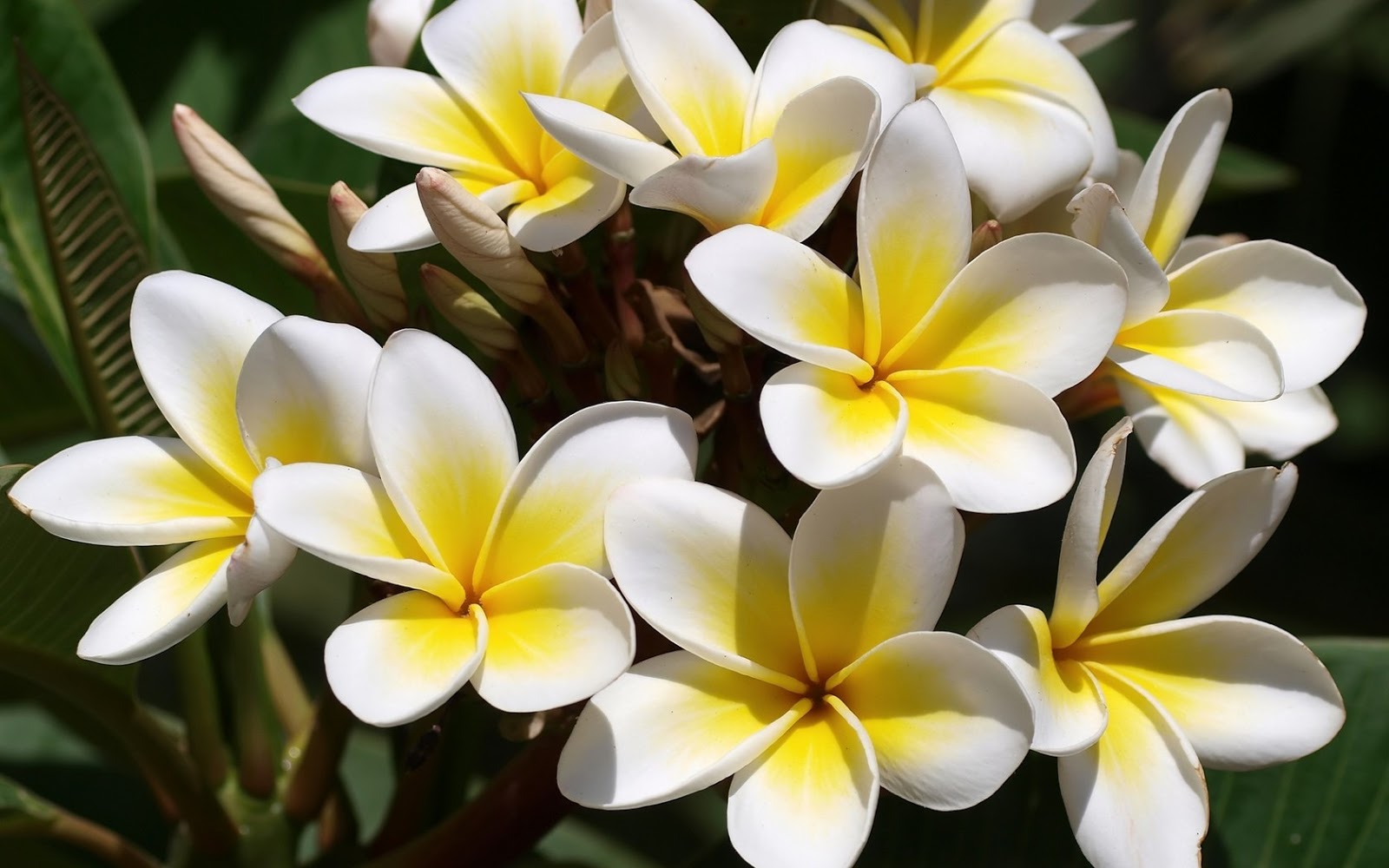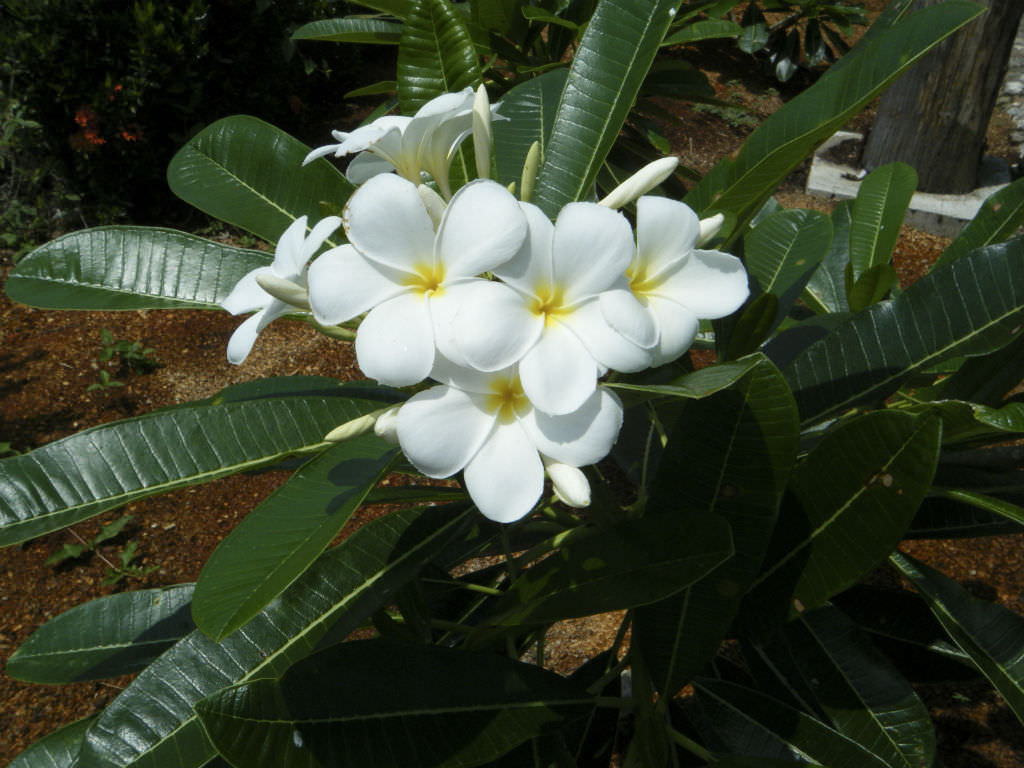White Frangipani Plant Care & Growing Guide
Plumeria alba-- White Frangipani Page 3 Figure 3. Foliage of White Frangipani. Other Roots: surface roots are usually not a problem Winter interest: tree has winter interest due to unusual form, nice persistent fruits, showy winter trunk, or winter flowers Outstanding tree: tree has outstanding ornamental features and could be planted more

Tropical White Frangipani Flower Tree Stock Image Image of ornamentals, frangipani 124847557
Plumeria alba is a small deciduous tree that grows up to 25 feet (7.6 m) tall. It features fragrant white flowers with yellow centers. Upright branches are thick but weak and have a milky sap. Leaves are green, oblong-lanceolate, up to 12 inches (30 cm) long, and spirally clustered at the stem ends.

Close Up of White Frangipani Flower on Tree Stock Photo Image of outdoor, design 71757196
White frangipani has a soft yellow center that fades to pure white near the tips of the flower. The Spruce / Gyscha Rendy Also known as a white plumeria, West Indian Jasmine, or nosegay, this tree has thick, gray-green, succulent branches and long, leathery green leaves. The tree often forms into an umbrella shape.

Beautiful White Frangipani Flowers on the Tree Stock Photo Image of backdrop, closeup 49499568
Plant outdoors in the same manner as other shrubs. Prepare the site by digging a wide, saucer-shaped hole. Place the plumeria in the hole after cutting any girdling roots. Adjust the height to match the new soil level with the old potted level. Backfill with native soil and topdress with compost.

Frangipani tree white Plumeria rubra white naturally grown in France
Nearly evergreen, White Frangipani works well as a freestanding specimen, a patio tree, or as part of a mixed shrub border. The wonderfully scented flowers are often made into leis or worn in the hair. Typically grows up to 10-25 ft. tall and wide (300-750 cm) Performs best in full sun in rich , dry to medium moisture, well-drained soils.

Plumeria obtusa 'Singapore White Frangipani' Ellenby Tree Farm
Plumerias, or frangipani, are a group of closely related flowering plants that are synonymous with "tropical." These plants can be grown from cuttings, and often look like sad, defoliated sticks upon planting. However, they grow fast and often outshine their mature peers in the landscape. If you're hoping to add a tropical aesthetic and a.

Amazing Fact About Frangipani / Plumeria Alba / Pohon Kamboja 2/11/2018 Hidden Place for Visit
It grows as a spreading tree to 7-8 m (23-26 ft) high and wide, and is flushed with fragrant flowers of shades of pink, white and yellow over the summer and autumn. Its common names include frangipani, [2] red paucipan, [2] red-jasmine, [2] red frangipani, common frangipani, temple tree, [2] or simply plumeria.

White Frangipani Stock Photo Image 26593800
White frangipani (Plumeria alba): is often confused with white-flowered varieties of Plumeria rubra and is less common as a houseplant. There is also an incredible colour variation within deciduous species [Photo: Arvind Balaraman/ Shutterstock.com] Frangipani as a houseplant: location and soil. Frangipani plants love sunlight and high humidity.

The white frangipani tree. . takes me right back to Granny's front garden and flowers in our
White Shell #111 Plumeria (Frangipani) Tree Discover the unique and enchanting beauty of White Shell #111 Plumeria, a rare cultivar that showcases small white flowers with striking red bands.. King Arthur Plumeria (Frangipani) Tree Step into the realm of enchantment with the King Arthur Plumeria, a regal addition to the world of plumeria.

Frangipani tree white Plumeria rubra white naturally grown in France
Plumeria alba, commonly called white frangipani or nosegay, is a small rounded deciduous tree of the dogbane family that grows in a vase-shape to 15-25' tall. It features fragrant white flowers with yellow centers. Upright branches are thick but weak, and have a milky sap. This species is native to Puerto Rico and the Lesser Antilles, but has.
:max_bytes(150000):strip_icc()/white-frangipani-growing-profile-3269296-02-1b8409ec76314216bbff4bd1bf5988ad.jpg)
White Frangipani Plant Care & Growing Guide
The flowers are white and the plant grows more compact and upright, making it a good accent by the entry or in that skinny spot next to the garage door. Bridal Wreath is considered evergreen, though it may defoliate in a harsh winter. Why are some flowers more fragrant at night?

How To Grow And Care For Frangipani Bunnings Australia
Growing Conditions for Frangipani. Frangipani needs at least six hours of bright sunlight exposure each day, preferably in full sun, but can do well in the shade. Frangipani prefers a well draining soil of any type except for clay. Optimal pH levels should be in the 6.5 to 7 range. Poor drainage can lead to root rot.

Plumeria alba (White Frangipani) World of Flowering Plants
General Information Scientific name: Plumeria alba Pronunciation: ploo-MEER-ee-uh AL-buh Common name (s): White Frangipani Family: Apocynaceae USDA hardiness zones: 10B through 11 (Fig. 2) Origin: not native to North America Invasive potential: little invasive potential
White Frangipani Plant Care & Growing Guide
Noteworthy Characteristics. Plumeria obtusa, commonly called pagoda tree or white frangipani, is a small, rounded tree of the dogbane family that typically grows to 10-15' tall but less frequently to 25' tall.It is native to the Bahamas and the Greater Antilles, but has been introduced into a number of tropical areas around the world.
/WhiteFrangipaniFlickrZachiEvenor-56a98d663df78cf772a832ec.jpg)
White Frangipani Plant Care and Growing Guide
frangipani, (genus Plumeria ), genus of about 12 species of deciduous shrubs or small trees in the dogbane family ( Apocynaceae ), native to the New World tropics. Several species, especially Plumeria rubra, are widely cultivated as ornamentals in warm climates for their attractive and fragrant flowers and are easily propagated from stem cuttings.

White Frangipani Flowers on Tree. Stock Image Image of tropical, petal 98148431
Plumeria ( / pluːˈmɛriə / ), also known as frangipani, is a genus of flowering plants in the subfamily Rauvolfioideae, of the family Apocynaceae. [1] Most species are deciduous shrubs or small trees.